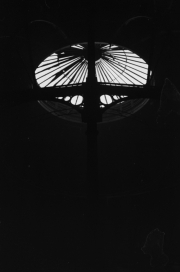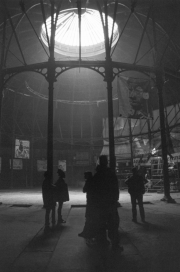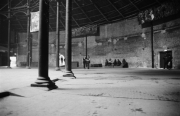Roundhouse
I worked at the Roundhouse over a period of 3yrs. Firstly as an actor in a production of ‘Future Shock’ [See the separate story for more about that ] in 1978 and when that ended, as Deputy Production Manager for the next few years.
I only discovered some years later that my job title was Deputy Production Manager. At the time, I just saw myself as a member of a rather eccentric team of people that rather miraculously kept the Roundhouse going. The charismatic team leader, or Production Manager, was Neil Cooper. I couldn’t immediately understand why they would want to employ me as they only had experience of me as an actor. But then the Roundhouse has never operated like other theatre’s and there was method in Neil’s madness, as I later discovered.
He obviously saw a kindred spirit in me and had identified, quite correctly, that I was the sort of person that would turn my hand to anything and not get hung-up on job descriptions. There were specialists for lighting but even they would pitch in if required. We just worked as a team whose aim was always to get this wonderful building to accommodate whatever production or concert we were hosting next.
The Roundhouse was not unionised because it would have folded overnight if we had had to stick to defined roles…as happens in most theatre’s. This was a tricky area, as I was to discover later. Despite being a member of Equity, the actors union, my conscience was clear and I could see the bigger picture. I felt connected to the place. Partly because my sister had worked there as an accountant a few years previously and also because I had been going to see concerts there for a number of years. It was my kind of place. I felt honoured to be invited to work there.
It transpired that Thelma Holt, the buildings’ director, had plans to try and attract more theatre companies to use the space. It’s reputation as a music venue meant that most people just saw that but a recent law case, regarding decibel levels, had meant that a change of use was essential if the venue was going to survive . She was a theatre producer at heart and this was her opportunity to do what she did best…and boy did she achieve that. With not a little help from all of us that worked there.
I then discovered the reason I had been taken on, was because the Roundhouse was about to play host to a season of three productions by the Manchester Royal Exchange company. Neil thought I would be a good ‘bridge’ between the incoming company and the Roundhouse production team, who were more used to Rock bands and a somewhat anarchic atmosphere. I lived in both those worlds and he was right, I revelled in this odd marriage. It was the first time I’d ever seen the Roundhouse used in the round and for the main, standout production of ‘ Lady from the Sea’, starring Vanessa Redgrave and Terrence Stamp, we had to flood the performance area. It was a stunning set with islands and trees and a working rowing boat. One evening, after the audience had gone home, we had to empty the pool so that the space could be used for a rehearsal the following morning. Fortunately this didn’t happen every evening…it was at least 2hrs of exhausting work at the end of a long day and so we just got our heads down and got on with it. At some point, one of my crew asked me if it was alright if a couple of American tourists came into the auditorium as they had lost an umbrella earlier and it was now pouring with rain. They were dressed in what seemed to be a bit of a uniform for American tourists at the time, Gabardine raincoats, light blue denim jeans and trainers. They were dressed identically. At first we didn’t pay much attention to them but they seemed to be struggling to find this umbrella and so I asked one of the crew to go and help them. It was Debbie Kermode, who’s brother is Mark, the film critic, who went to their assistance. She came over to me and said ” You know who they are, don’t you?” I replied in the negative. I was completely taken-up with the task in hand, ” No, who?” “It’s Paul Newman and his wife Joanne Woodward”. I glanced over and sure enough it was indeed them. I went over to them on the pretext of apologising for the loss of their umbrella. They were so ‘normal’, it was hard to take in who they were. They asked if I minded them staying and watching us work. They had never been to the Roundhouse before and were a bit spellbound by the place. Who was I to refuse? Mr [ it feels wrong to call him Paul] Newman then asked if we would like a drink and if so, he would just pop out and get some beers. Off he went, returning 15mins later with a couple of 6 packs. Whilst he was gone I sat and chatted with his wife who was fascinated by the building, the production they had just seen but most surprisingly, us. She wanted to know everything. It was almost a reversal of how you would imagine such an encounter to go. Then her husband returned and we all took a break and sat around drinking cans of Lager whilst they fired off endless questions about everything. At no point did we acknowledge who they were or indulge in questions about Hollywood etc. It was obvious from the outset that they just wanted to be treated as an ordinary couple who just happened to end-up sheltering from the rain in a Victorian train shed in North London. What’s so strange about that? Still, we had work to do and I could feel the rest of the crew getting a bit restless and so eventually I thanked them for the beers and the conversation and returned to the job in hand. As we carried on, they continued watching for a while and then got up, apologised for distracting us with the pointless umbrella hunt [we never found it] and left.
During the run of ‘Lady from the Sea’, I was in the building one morning when I heard that Vanessa Redgrave had called a cast meeting to discuss the non unionisation of the Roundhouse. I decided to listen in. She was calling for the cast to walk out on strike because she felt that we, the Roundhouse staff, were ‘blacklegs’ for not operating under Equity rules. The conservatives in the company were outraged by her highjacking of the company for her political ends and a heated discussion took place. I had previously been to a meeting at Central , when I was a student there, held by Corin Redgrave. He turned-up looking like Leon Trotsky and spoke non-stop about his radical agenda for world politics as seen through the eye’s of the WRP [Workers Revolutionary Party], which he and Vanessa were members of. I was a ‘soft’ lefty and found their radical politics rather chilling but had some sympathies for some of their theories. I certainly felt more empathy with her than the conservatives in the company but on the point of unionisation of the Roundhouse, I was very clear. I decided, rather foolishly, to enter the debate. I pointed out that the Roundhouse would never have existed as a performance space if it had abided by union rules. It was massively underfunded and occupied a place outside normal rules. Most of us were union members but Equity chose not to challenge our existence as a non union theatre because they understood the circumstances. I was impassioned about it and unfortunately my little intervention drew applause from the conservatives in the company and Vanessa was silenced. End of meeting. I immediately felt terrible when I realised that I had just played into the hands of these ‘right wingers’ and they seemed to want to hail me as their hero. Later that day, Vanessa asked me into her dressing room where she told me how saddened [ and nobody does saddened quite like Ms Redgrave], she was. I said I was sorry but on this one point I was firm and felt that there was a bigger picture. We agreed to disagree but I think in her eyes I had betrayed her.
One final note about this production. I was living with the love of my life at the time and although she was rather negative about actors [Me?] and theatre in general, she was desperate for some work. I needed a dresser for Terrence Stamp and asked her if she was interested. What was I thinking? She was very beautiful and he had been voted the most beautiful man in the world in some poll and as far as I was aware, single. Did I really want to test my relationship in this way? She relented and duly became his dresser but only lasted about a week. She was completely oblivious to his fame and beauty and I confess to being rather relieved when she said she wasn’t enjoying the job and left. In fact, I felt rather good. My girlfriend wanted to be with me, not around the most beautiful man in the world.
After the Manchester Royal Exchange season, we returned the auditorium to it’s usual configuration for the arrival of possibly the most important piece of theatre I’ve ever been involved with. It was Shakespeare’s Richard III performed by the Rustaveli Theatre Company from Tiblisi, Georgia. This was a real coup for Thelma Holt and expectations were high. On the day that they were due to arrive, we all waited with anticipation for their arrival. We had prepared the stage area but were unsure as to what kind of set they were bringing with them and consequently how much work would be involved in getting them ready for their first night’s performance. Neil had been to Tiblisi to see the production and had returned very excited but most of the information we needed got lost in translation, leaving us unsure as to what they would need from us.
The truck that had been driven all the way from Georgia, arrived late on a January afternoon in 1980. As it backed up to the dock doors, the whole Roundhouse team came to see what they had brought with them…we were in for a bit of a shock. As they opened the truck doors, we all looked at the contents with some consternation. To all intents and purposes, it was virtually empty. A few rolls of material, some bits of timber and down at the bulk head, a large metal case which we assumed contained lighting. We unloaded the bit’s and bob’s and then went for the metal case, which was ridiculously heavy. Having fully unloaded the truck, we all stood around with a million questions. The problem was, nobody spoke a word of the others language. We had employed a translator but she wasn’t due until the next day when the cast would arrive. They didn’t appear to want or need any help from us. We were confused and wondered if there was more to come but they indicated that that was it. Eventually, our lighting technicians asked if they could open the metal case to check the lighting and when it was opened, we discovered that it didn’t contain any equipment at all, just many, many bottles of Georgian wine and almost as many bottles of Vodka. We all toasted their arrival, with Vodka of course, and went home slightly perplexed.
When the whole company arrived the next day,having had to walk through crowds of anti-Soviet protestors, they immediately started to create a brilliant stage set with drapes and pieces of gnarled wood and a relatively simple lighting set-up. The production also included two musical elements that helped transform it from the ordinary. There was a jazz trio who played incidental music throughout and rather strikingly, every time Richard III entered, loud funk rock blasted out. We hadn’t expected that from beyond the Iron Curtain. It was a revelation on so many levels. The actor playing Richard III was Ramaz Chkhikvadze…possibly the greatest actor I have ever seen. Despite the fact that the performance was spoken in Georgian or perhaps because of it, it was the most lucid production of a Shakespeare play I’ve ever seen. On their last night, some the company, who had been teetotal throughout the run of the play, came to the bar and had a few drinks. At one point, two or three of the men started a deep drone sound and one by one the others joined in with harmonies until they had transformed the atmosphere of a bar in North London to a place far away in time and history. The legacy of that company resonated through British Theatre for years to come and for those of us that worked on it and for those that saw it, it changed everything.
The production was a complete success. The critic’s loved it and celebrities from the theatre and film world came in their hundreds. Because the Rustaveli Company were so independent, we didn’t have much to do during the performances apart from a couple of us acting as extra’s in one scene. So we would go up to the balcony and watch the show and the audience. One particular evening, I spotted two Hollywood actresses who I would have assumed knew each other as they were famous at around the same time and had both been icon’s of the 60’s. They were sat well away from each other and I couldn’t see any contact between them all evening, which seemed strange. They were Ursula Andress and Raquel Welch. A rather surreal postscript to a piece of theatre history.



